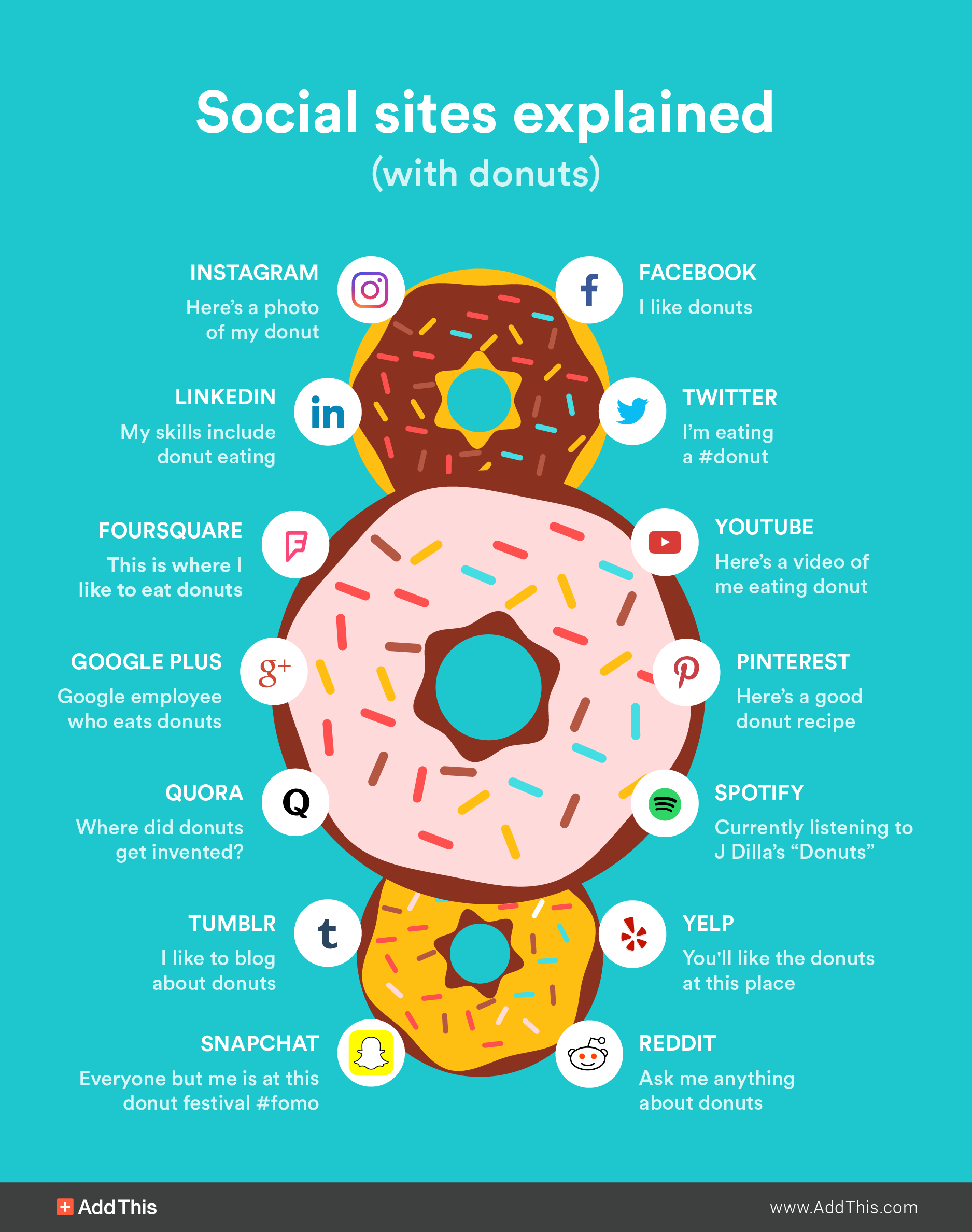You're not ignorant of the potential of social media, you just want to better understand it before you put your time and effort into applying it in your business - we get that. Unfortunately for us, it's a huge topic and entire libraries have been written on social media and the impact that social feedback has had on the spread of information, so we don't expect that this short article will do much more than whet your appetite. That said, we'll work to make it all a bit easier to digest...
What is Social Media
Social media is a relatively cheap, if not free, marketing approach to leveraging your existing audience or cultivating a new one. It can amplify your voice in seconds and even land you in the spotlight for your brand's proverbial 15 minutes of fame (whether you're ready to be there or not). For marketing purposes, social media has more in common with an in-person elevator pitch than it does a TV ad. This can be good or bad, depending on how you're able to process audience feedback in real time and how effective you are at adjusting your message to meet your audience's interests (and vocal opinions) as they ebb and flow.
Here is a Wikipedia definition of social media for your reading pleasure, but in short, social media is nearly any communication that allows for direct and immediate, dynamic feedback from the audience interacting with it. Let's take an example... a blog. A blog isn't necessarily social... sure, you can share it socially, but it's not inherently social any more than a business card in your pocket is. Now, let's say that you add a live comments feature under the blog. At this point, it's beginning to become more social. In short, the difference between media and social media is not the technology that delivers it, but the technology that allows for immediate audience feedback that all can see. If your communication/message/advert can't be publicly-judged right there for all to see (for better or for worse)... then it's not social.
Social Media "Platforms" Aren't Necessarily Competitors
Okay, so that's social media as a concept, but let's take a look at social media technologies - which are more often referred to as platforms. You might hear names like Facebook or Twitter and try mentally to lump them all together as "social media." But in reality (and in practice), social media platforms such as Facebook and Twitter aren't competing technologies (in the same way that TV, radio and/or print aren't competing technologies). Sure, they may all be fighting for your ad dollars, but you could spend your ad dollars on all of them in a single campaign and they'd all get along just fine.
In fact, any marketer worth their salt will tell you that to have a really effective marketing campaign, you'd ideally use several marketing channels/technologies/platforms and aim to reach as many audiences as possible while building upon a single, core message over and over again (gaining as many impressions as possible). Of course, you can do this sort of impression stacking across social media platforms, you just want to be sure to coordinate your messaging and your efforts so that one hand isn't undoing what the other hand spent a lot of time, effort and money to get done.
Unfortunately, to make this whole thing a little more confusing, you might hear names of social media companies and the names of the social media platforms these companies offer to the world used interchangeably. Like... "Google" is a company that has a search product called "Google" and when you use it, you're "Googling." That's a concept you might not have been able to wrap your head around 10 years ago, but you learn to adjust. Of course, Google has since changed its parent company name to "Alphabet" so... that's a thing.
Don't Drop Your Message, Dialog It
It's important to understand that social media is a way to communicate that involves a back-and-forth, ongoing dialog with the audience versus the now-older method of marketing and communication employed by a one-way TV broadcast or magazine print ad (which provides no way to show the dynamic opinions of the audience the message is reaching). This is what makes social media "social" (the fact that the audience's opinion is posted right next to the communication or ad). So, it's important to remember that it's not so much a communication technology, it's an approach to communicating.
In order to be well-received by a consumer of social media, your messaging must employ aspects of back and forth feedback versus just blasting an ad, then high-fiving and going home. For this reason, and contrary to many misconceptions about the channel, you should not be "pushing messages" via social media... why? Because your audience may (and often does) push back. Instead, build messaging that inspires and anticipates input, then... be there to embrace it. Now, if you think that becoming a bit of a PR spokesperson (or "brand hostage negotiator") isn't what you've signed up for, then here's some more bad news... things change (often and quickly enough to be noteworthy).
Some Frustrations You're Going to Have to Get Used to
Unlike traditional marketing channels (TV, radio, print, etc.), the rules to social media engagements can change fast. Just as you get into the swing of things and start reaping the rewards of a given social media campaign, the social media platform your campaign was using may have adjusted access to your target audience. It's as if you've finally nailed that perfect, mid-afternoon TV ad, but then all of a sudden, the programs you've been advertising between change to something completely different and your audience isn't the same, or worse, the TV station suddenly tells you that your ad just isn't a fit and denies you access to that time slot or the station as a whole.
Again, it's not so much that this is a new problem (any TV station can make this kind of call after all), it's more the speed by which this can happen and the fact that these platforms might not overtly tell you that this has taken place. And while your social interactions are less often advertisements, they are often treated in the same manner by social platforms. Let's explore some of the major pivots that larger social platforms have taken over the years and what that may have meant to advertisers at the time...
- In November 2017, Twitter mildly shocked the marketing/user world by expanding their notoriously-limited tweet character count from 140 characters to 280 characters, effectively doubling each message's outer limit length. Why did this matter? Consider the impact of a switch in policy where Superbowl ads, which may have formally been limited to 15-second spots (without exception), are then, out of the blue, allowed to extend to 30-second spots at no extra cost to the advertiser. While this may be great for those about to launch campaigns (after all, they just doubled their ad's message limit for free), anyone that made 15-second spots their area of expertise now has to figure out how to compete in a new market that is potentially easier to penetrate. On the flip side of that coin... Twitter arguably became popular as a platform, at least partially, because it limited a message to the digital equivalent of an elevator pitch. In the same way that doubling an elevator pitch's duration could change the result of the pitch and the very definition of the act, there were a lot of questions that marketers and users, in general, had regarding how this would affect their own messaging and the audience consuming it.
- In June 2016, Facebook announced (ever-so-nonchalantly) that they were updating their algorithm to make personal communications more prevalent than those communication coming in from publishers, brands, groups, pages and so on (even if those other entities were liked by or owned by the Facebook user). What's more, unless you happened to be reading Facebook's corporate blog or unless you happened to stumble upon a technical article in the news regarding the sudden shift in audience reach, you wouldn't necessarily know that this would or had happened. To really stack on the pain felt by Facebook marketers, if you were paying for extended reach into nearby audiences (let's say... a friend of a customer who "liked" your product and/or Facebook page), you might save a bit of money by your ad having not reached that market, but you will have lost the opportunity to make that decision for yourself (maybe, for instance, had you known this was going to happen, you could have withdrawn your Facebook marketing dollars and invested them into something with more obligetory reach - time is money after all).
While there's a lot more to these stories (both positive and negative, depending on your point of view and possibly whether you're paying for ads or the recipient of them), both tell a larger tale of caution - one of change. As first mentioned in this article, social media allows for rapid, overnight penetration into a wider audience - at least that's the potential win for marketers like you that SMO's have made their career to leverage on your brand's behalf.
Unfortunately, this is all the dangerous truth about social media and why you would do well to listen to SMO's when they warn of an impending platform policy change. These sorts of shifts happen often, so depending on your ad/marketing budget, you might want to look into hiring an SMO for your needs. Just like the stock market... you can make a lot of money fast... but so too, can you lose it. Knowledge and nimble retargeting of audience messaging can make all the difference in the world when it comes to ROI.
What's an SMO... you mean SEO... CEO... OREO?
You've likely heard of SEO (Search Engine Optimization), but what about SMO? If "I'm the listing agent you need to use!" is the core message that your ad agency or marketing specialist has come up with for use across all of your marketing campaign channels/technologies (TV, radio, print, etc.), then your Social Media Optimization specialist (SMO) might say "Great, here's how we form that message into a conversation and leverage specific social media platforms to interact with the target audience around it..." That interaction makes it a social engagement or "social media" and your SMO is the one that's going to drive that conversation towards a specific outcome (selling a widget, promoting your brand as a trustworthy name, etc.).
Getting Social
So, let's assume that you haven't brought on an SMO and that you don't plan on doing so (at least anytime soon). If this is the case, then all of this above is to lead up to recipe on how to properly craft and distribute your message for a given platform (again, for Facebook, Twitter and the like). Keep in mind that as time goes on, each company continues to expand their services and that has led to some bleed over in what these companies and platforms offer. For the purposes of this (relatively) short article, we'll try and keep each platform to its core value proposition. If you don't know what we're talking about, don't worry about it at this stage.
What you'll need to understand is that social media marketing less about a single, unchanging message and more about a core message that has a conversation around it that changes, depending on the social platform it's deployed (but also based on the response it gets from the audience it's reaching or not effectively reaching). Each social platform is quite different from one another and therefore requires a different approach when leveraging them to broadcast your core marketing message ("I'm the listing agent you need to use!") to your target audience ("People I barely know that live in the neighborhood I'm farming").
That said, you will likely find the same people moving in and out of various channels. For instance, you may have a Facebook and Twitter account - likely a few others as well. If you use Gmail, then you're already on a social media platform whether you use it that way or not (but that's a little more than you need to know at this stage). For now, let's recap... social media is a back-and-forth conversation with the audience it serves and social media technologies or "platforms" such as Facebook or Twitter are like the devices you use to have the conversation and each affects the way you converse about a topic. That last part's important. Here's a cute look at the various social media platforms and how a conversation around something as simple as a donut changes (depending on the platform used to discuss it)...

What to Say
Okay, so let's say "donuts" aren't exactly your top priority at the moment - that you're seeking serious insight on leveraging social media (and more specifically, certain social media platforms) to market your message of "I'm the listing agent you need to use!" First, as you've discovered here, there's a lot of ground to cover and you might do well to put an SMO in place in order to help you in this effort. Of course, if you're like most agents in the field, you may not be able to budget for one.
The good news is that social media itself is free. As for how you use that megaphone of choice to stand on that metaphorical soapbox and "connect with your audience" is another skill entirely. And while we can't run your campaign for you, tools like those provided at www.offrs.com can indeed bolster your marketing efforts and the scripts found here may help you better understand how you can approach people in ways that build dialog with your neighbors rather than push a message down their eye sockets.
You can do this!
offrs collects and provides topical insights, statistics, reviews, humor and best practices gathered from real estate professionals and consumer homeowner industry peers. If you're a broker or agent interested in learning more about the top real estate lead generator or if you're just curious where real estate agent leads come from, visit www.offrs.com or continue to browse our growing collection of industry articles at www.offrs.net.





















